- Home
- Martin Cruz Smith
Tatiana ar-8 Page 7
Tatiana ar-8 Read online
Page 7
“Do they have names?” Arkady asked.
“Fuck off,” said one bird.
“Piss off,” said the other.
“Don’t get them started,” Kunin said. “It’s bad enough that the tropical forest they came from has been despoiled. . by international corporations. . logging in the Amazon, paradise lost. My charts are virtual tombstones. . Thank God for DNA. . For example, who the devil are the Lapps? Really.”
“A good question. Do you have five minutes to look at this?” Arkady produced the notebook.
“Ah, as you mentioned on the telephone; your piece of evidence.” The professor pushed books off his desk to make room. “You’re in luck. I have been making a study of ‘interpretation’ to see whether it tells us something about the foundations of language. The basic words. Mother. Father.”
“Murder?”
“You get the drift. Because each interpreter creates his own language.”
“Ah.”
“You’ll see.” Kunin sipped oxygen and studied the pages. “I can tell you, to begin with, one thing that’s odd. Usually the first thing a professional interpreter does is write on the cover of his notebook the name of the event, the parties involved, and the place and date the notes were taken. Also his name, mobile phone and an e-mail address in case the notebook is lost or stolen. Perhaps promise of a reward if found. This notebook has no identification. There is the name Natalya Goncharova, Pushkin’s wife, but of course she was a historical figure and a slut to boot.” The professor emeritus stopped for air and returned to the first page. “It’s hard to say with so few pages actually written on but it seems to be a notebook commonly used by journalists or consecutive interpreters. I would say that by the use of some commonly used symbols this was the notebook of a consecutive interpreter. Party A speaks in one language, which the interpreter relays in a second language to Party B. So it goes back and forth. If he keeps good notes, he can deliver a complete and accurate translation whether the parties speak for one minute or ten. It’s an amazing mental feat.”
Arkady was more confused than ever. Each page was blocked into four panels with a dizzying solar system of hieroglyphs, half words and diagrams. He felt like a fisherman who had hooked a creature far below the surface of the water with no idea of what he had caught.
“From these pages an interpreter can reconstruct an entire conversation?”
“Yes. And aren’t they lovely? Beyond arrows signifying ‘up’ or ‘down.’ A bumpy line for ‘difficulties.’ A loop and an arrow meaning ‘as a consequence.’ Genius. A ball and line for ‘before’; a line through the ball for ‘now.’ An interpreter creates a new symbol and other interpreters follow. It’s the creation of language before your eyes. A ball in a three-sided box? ‘A goal,’ naturally. Crossed swords? ‘War.’ A cross? ‘Death.’ ”
“Then we should be able to read it too.”
“No.” Kunin was just as definite.
“Why?”
“These are just the commonly accepted symbols. I can write them in for you. The rest are his. We don’t know the context.”
“If we knew, could we read the notes?”
“Probably not. It’s not a language and it’s not shorthand. Interpretation is a system of personal cues. No two interpreters are alike and no two systems are the same. For one interpreter, the symbol for ‘death’ might be a gravestone, for another a skull, for another a cross like this one. Symbols for ‘mother’ run the gamut. Cats can be sinister or cozy.”
“They don’t look warm and fuzzy to me.”
“See, the double triangles could be a map, or a constellation, or a route with four stops.”
Arkady had seen the shape before; it danced just beyond his grasp. He tried not to try too hard to remember because answers came when the mind wandered. Stalin used to draw wolves over and over.
“Or a bicycle frame,” Arkady said. He remembered going into a bike shop with Zhenya. Hanging from the shop ceiling had been a row of bicycle frames in different colors. “Someone was building a bike.” He walked the idea through. “An expensive bike for a serious biker.”
“You don’t know that for a fact.”
“This was custom-made. Not like adding a bell to the handlebars.”
“Renko, I’m dragging around an oxygen tank. Do I look like I know from bicycles?”
And that was it. Abruptly, Arkady was dry. He had gone as far as this slender branch of guesswork could support him.
• • •
“Is this Lieutenant Stasov?”
“I’ll put you on hold.”
“Tell the lieutenant that Senior Investigator Renko is on his cell phone from Moscow and wants to talk to him.”
“You’re first in line.”
Arkady was first in line for twenty minutes, time enough to return to his apartment and heat a cup of stale coffee.
Finally, a voice as deep as a barrel answered.
“Lieutenant Stasov.”
“Lieutenant, I need just a minute of your time.”
“If you’re calling from Moscow, it must be important,” Stasov said. Arkady could picture him winking to his pals in the squad room, taking the piss out of the big shot from Moscow. “What can I do for you?”
“I understand that you are the lead detective in the case of a dead body found ten days ago on one of your beaches.”
“A male homicide, about forty. That’s correct, at the spit.”
“The spit?”
“Where the land narrows. Beautiful beach.”
“Is the victim still unidentified?”
“No ID and no address, I’m afraid. If he had a wallet, it’s gone. I’m just glad it didn’t happen in the summertime when the beach is full of families. Anyway, we dug a bullet out of his head. Low caliber, but sometimes that’s what professional killers use.”
“A contract killer?”
“In my opinion. We will conduct a thorough investigation. Just keep in mind, we don’t have the technical gear that you have in Moscow. Or money, after Moscow drains the coffers. Moscow is the center and we are the stepchild. I’m not complaining, only putting you in the picture. Don’t worry, we’ll get to the bottom of this.”
“What did he look like?”
“We had some photos. I’ll find them.”
“Besides photographs, what was your general impression of the victim?”
“Skinny. Short and skinny.”
“His clothes?”
“Tight and shiny.”
The lieutenant was going to drag it out, Arkady thought.
“Tight and shiny as in biking gear?”
“Could be.”
“Shoes? There’s no mention of them in your report.”
“Is that so? I guess he took them off to walk in the sand. Or one of the local boys stole them.”
“That makes sense. Did you find anything else?”
“Such as?”
“Well, if he were an artist he might have brushes and an easel. Or if he collected butterflies, he’d have a net. If he was a biker, he had a bike. He was found on the beach. There was no bike?”
“Who bikes in the sand?” Stasov asked.
“That’s what I’m asking you.”
“I’m really sorry I can’t help you out. The guy was a fruit.”
Now, what could make the lieutenant say that about a dead man he had never met? Arkady wondered.
“Did he shave his legs?”
“Weird, huh?”
“What kind of public transportation is there from the city of Kaliningrad to this place you call the spit?”
“During the off-season, none.”
“A person would have to drive or walk?”
“I suppose so.” The lieutenant was wary now.
“Were any cars reported stolen or abandoned near the beach?”
“No.”
“Bicycles?”
“No.”
“Helmets?”
“Shit, Renko, relax. I’ll let you know when we fin
d something.”
“Tell me again exactly where the body was discovered?”
Lieutenant Stasov hung up, leaving Arkady staring out the kitchen window. The coffee was vile. It had been made the night before and warmed up at least twice. He had heard that in Japan restaurants were rated according to how many times the same cooking oil was used. Naturally, the first time was the best. The oil was then used by one restaurant after another, steadily degrading into brown sludge. He contemplated his cup and wondered what the record was. Always a thrill for the heart. He drank it in one go.
Professional cyclists shaved their legs for an infinitesimal edge in aerodynamics. An amateur might too if he was serious enough-serious enough to have a custom bike built just for him. What sort of personality would that demand? Athletic. Competitive. Older than twenty-five, younger than forty-five. Willing to invest much of his life in cycling. Well ordered, not Russian. Obsessive. Swiss? German? Comfortable traveling alone and on business; no one went to Kaliningrad for pleasure. For that matter, no one had reported him missing. An invisible man.
Arkady was startled to find Zhenya behind him.
“In a trance?” Zhenya asked.
“Just thinking.”
“Well, it looks strange.”
“No doubt,” Arkady said.
“I came to pick up some clothes. That’s all.”
It was clear now that Zhenya would never kick a winning goal at Dynamo Stadium or inspire supermodels to sigh in his direction. A camouflage jacket overwhelmed his shoulders; his hair was twisted and his features pinched, redeemed only by the vibrancy in his gray eyes.
What to Arkady was really odd was how Zhenya managed to enter the apartment and get to the kitchen without being heard. The parquet floor squeaked under anyone else.
“How are you?”
Zhenya reacted as if Arkady had uttered the stupidest question ever formed by the mouth of man. “What’s this?”
“A notebook of interpretation.”
“Whatever that is.” Zhenya flipped the cover back and forth.
“Code. A personal code written by a dead man.”
“Oh. What’s it about?”
“I don’t know.”
“Is this what got him killed?”
“Maybe. Are you hungry?”
“There’s nothing in the refrigerator. I checked it out. Hey, you never told me how famous your father was. The army guys were real excited.”
“They can stay excited until you’re eighteen.”
“This is such bullshit. Who gave you the authority to boss me around?”
“The court did, so you could register for school.”
“I quit school.”
“I noticed.”
“No, I mean I really quit school. I went to the registrar’s office and told them, so there’s nothing for me to do but enlist early.”
“Not without my signature. Seven months. You’ll just have to wait to be crazy.”
“You’re just putting it off.”
“That’s right.”
“Do you know how old Alexander the Great was when he conquered the world? Nineteen.”
“A precocious lad.”
“Do you know who his teacher was?”
“Who?”
“Aristotle. Aristotle told him to go conquer the world.”
“Maybe he just meant travel.”
“You’re impossible.” This was the point when Zhenya usually turned around and went out the door. This time he slumped into a chair and let his backpack fall. He always carried a folded chessboard, pieces and a game clock, but he was becoming too well-known as a hustler. He no longer looked innocent. Maybe he never looked innocent, Arkady thought. Perhaps that was his fantasy.
“What do you know about bikes?”
“Bikes?” As if Arkady had asked him about Shetland ponies. “I know you’d have to be an idiot to ride one in Moscow traffic. Why, were you thinking of getting one?”
“Finding one.”
Zhenya reached out for the notebook and idly turned the pages. “So what’s the story on this code?”
“It’s a code, hieroglyphics, anagram, riddle and worse because it’s not meant to be solved. There’s no Rosetta stone, no context. It might be about the price of bananas but if we don’t know his symbol for ‘banana,’ we’re lost. In this case, the only context, maybe, is bicycles.”
“It doesn’t sound like you got very far.”
“You never know.”
“Profound. Is there any milk?” Zhenya launched himself in the direction of the refrigerator.
“See for yourself.” A psychologist had once told Arkady that Zhenya was finding it difficult to separate. Arkady was finding that harder and harder to buy. “So, what do you know about expensive, custom-made bikes?”
“About as much as you do.”
“That’s too bad, because I know nothing.”
“Then you’re fucked, aren’t you? Well. . I only came to pick up some clothes.”
That served Zhenya as hello and good-bye.
9
Whenever Arkady opened the laptop on his desk, he felt like a pianist who, as he sat at the keyboard, realized he had no idea which keys to hit. He felt the audience stir, caught the panicky eye of the conductor, heard whispers from the string section. Fraud!
Arkady searched for “Kaliningrad interpreter.” It turned out that Kaliningrad interpreters doubled as romantic escorts, which was a bit too general. He tried “Kaliningrad conference interpreter” and learned that various conferences would soon be held: “Immanuel Kant Today,” “Endangered Mollusks of the Baltic Sea,” “Friendship with North Korea,” “Amity with Poland,” “Welcome to BMW,” etc., all of which demanded interpreters but gave not a hint of who they were. “Kaliningrad hotels” prompted a list that offered a fitness center, indoor pools and views of Old Town and Victory Square. More specifically, “Kaliningrad conference hotels” offered Wi-Fi, business centers, meeting rooms and authentic Russian banyas. Arkady pictured foreign businessmen, red as boiled lobsters, whipping each other with birch twigs.
Arkady felt reasonably sure that an international interpreter was well paid and well traveled. He discounted the possibility that the dead man had been staying with friends. Why sleep on a couch when he could enjoy the attentions of a luxury hotel where his employers presumably paid the bills? They wouldn’t want their interpreter out of reach, not when he was vital to any business they carried on. Anyway, there was something solitary about the interpreter. Arkady could not imagine two people with less in common than himself and Tatiana Petrovna.
How long could they keep the interpreter’s body if he went unclaimed? That depended on shelf space at the morgue and the medical school’s demand for cadavers, in which case he would be whittled away, slice after slice, like a Spanish ham.
Arkady called Kaliningrad’s small clutch of four- and five-star hotels; the replies were humiliating.
“You want to know if we have lost a guest. You don’t know his name or nationality. When he checked in or checked out. Whether he was at a conference or alone. You think he rode a bike. That’s all?”
“Yes.”
“Is this a joke?”
“So far.”
One hotel advised Arkady that “all inquiries concerning criminal or suspicious activity should be reported immediately to Lieutenant Stasov.” A plum assignment, Arkady thought, to have passports, credit cards and luggage pass through his hands.
Arkady moved on to “bicycle rentals.” He doubted that anyone would risk bringing his own custom bike to a city that was famous for the theft of anything on wheels. The problem was that thieves did not advertise and few shops could afford a website.
Noon. After four hours at the computer, he couldn’t stand one more cup of bitter coffee and went to an Irish pub around the corner. The bartender was a genuine Irishman surrounded by faux atmosphere: crossed hurley sticks, a ladder of Irish football teams, a song wailed by the Chieftains. A flat-screen monitor
showed of all things a bicycle race in progress. Arkady watched the wheels hypnotically go round and round and round. The chalkboard offered ten beers on tap. A food board offered, among other items, soda bread, barmbrack, goody and crubeens.
Arkady was intrigued. “What is barmbrack?”
“Fooked if I know.”
“What is a goody?”
“Beats me.”
“Crubeens?”
“Pig trotters. A man could starve to death from the fookin’ ambiance here. Come back tonight. We have waitresses in short skirts who step-dance on the bar.”
Arkady didn’t feel up to that. “Just a beer and soda bread.”
“With gluten or without?”
“Just a beer.”
The bartender sneaked a look at the television. “It’s the Irish Ultra Marathon World Cup. Want a thrill?” He picked up the remote control and froze the picture. “That’s me in the emerald-green jersey, right behind the asshole in the Union Jack who’s about to crash. I can’t stand this.” He turned the monitor off. “It gives me a chill every time I see it. Like a goose flew over my grave. What was your order?”
“Just the beer.” Arkady squinted to read the bartender’s name tag. Mick. Mick sounded authentic enough. “So you know about bikes?”
“I hope so. Where are you going?”
“I’ll be back.”
• • •
By the time Arkady was nine years old, General Renko had largely retreated to his library, into an aura of red velvet drapes. The room was forbidden to Arkady. Occasionally, the general called for him to bring vodka or tea and he glimpsed irresistible photographs of a gutted city, and a collection of German helmets and tattered battle standards. The room’s single light was a desk lamp, and there the general conjured up his enemies.
Arkady waited for his chance, and when the door was left ajar, he sneaked in. He raced around the room taking inventory, until he came to standards topped by swastikas and eagles. He was fascinated most by an SS standard of a skull and bones. The fabric was silk, stiff with blood. He didn’t hear the general return until he was almost in the room.

 Polar Star
Polar Star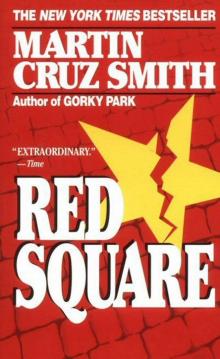 Red Square
Red Square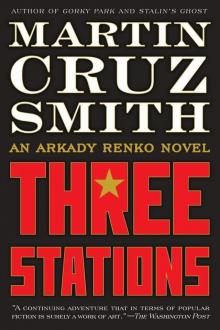 Three Stations
Three Stations Wolves Eat Dogs
Wolves Eat Dogs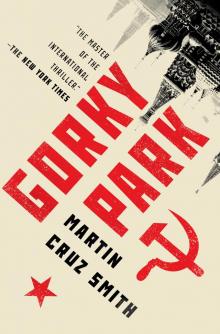 Gorky Park
Gorky Park December 6
December 6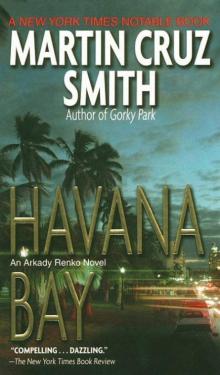 Havana Bay
Havana Bay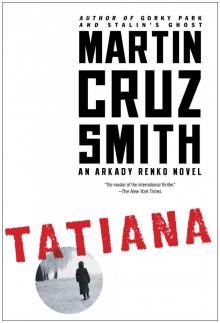 Tatiana
Tatiana The Girl From Venice
The Girl From Venice Stalin's Ghost
Stalin's Ghost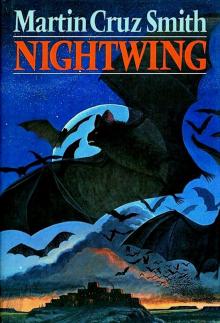 Nightwing
Nightwing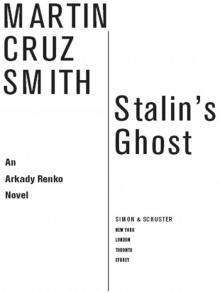 Stalin s Ghost
Stalin s Ghost Gypsy in Amber
Gypsy in Amber Rose
Rose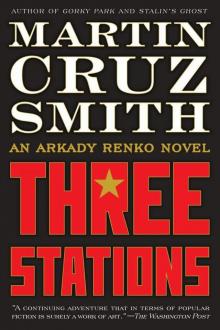 Three Stations: An Arkady Renko Novel
Three Stations: An Arkady Renko Novel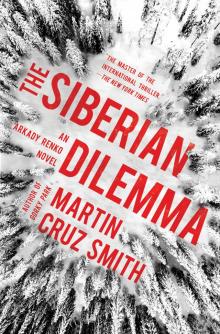 The Siberian Dilemma
The Siberian Dilemma December 6 (V5.0)
December 6 (V5.0)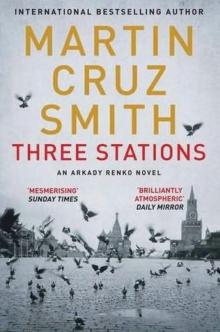 Three Stations ar-7
Three Stations ar-7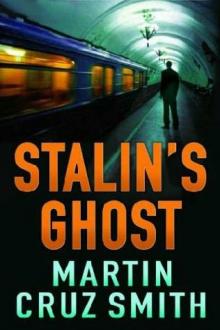 Stalin’s Ghost ar-6
Stalin’s Ghost ar-6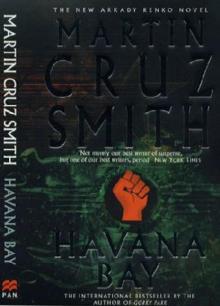 Havana Bay ar-4
Havana Bay ar-4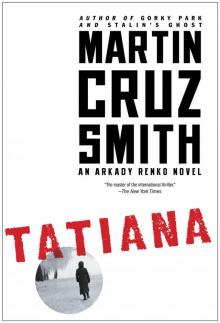 Tatiana ar-8
Tatiana ar-8